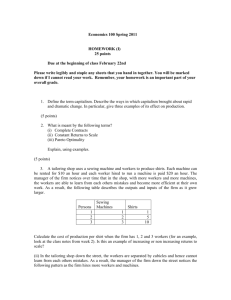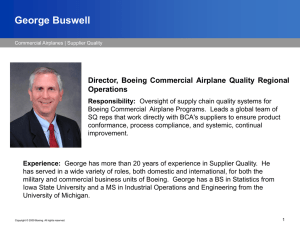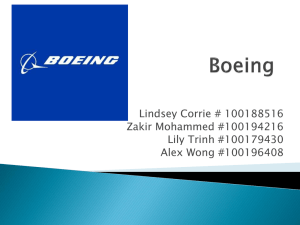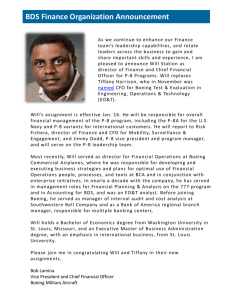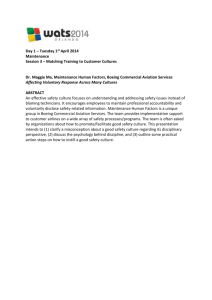Page 35- Bus 4.indd
advertisement
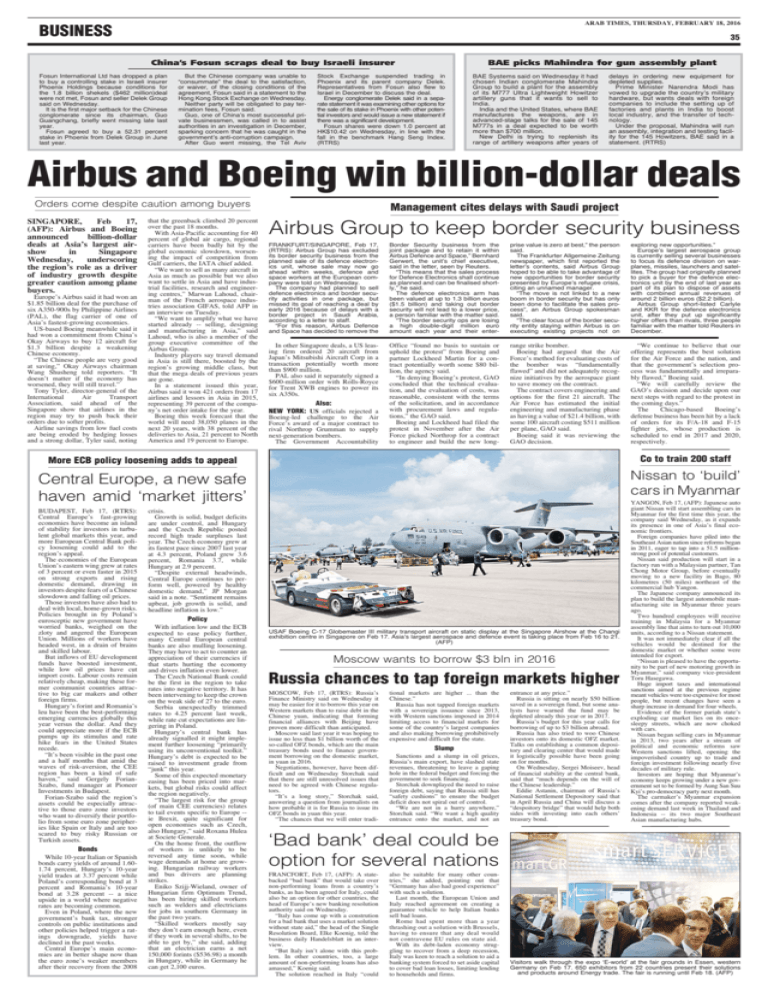
ARAB TIMES, THURSDAY, FEBRUARY 18, 2016 BUSINESS 35 China’s Fosun scraps deal to buy Israeli insurer Fosun International Ltd has dropped a plan to buy a controlling stake in Israeli insurer Phoenix Holdings because conditions for the 1.8 billion shekels ($462 million)deal were not met, Fosun and seller Delek Group said on Wednesday. It is the first major setback for the Chinese conglomerate since its chairman, Guo Guangchang, briefly went missing late last year. Fosun agreed to buy a 52.31 percent stake in Phoenix from Delek Group in June last year. But the Chinese company was unable to “consummate” the deal to the satisfaction, or waiver, of the closing conditions of the agreement, Fosun said in a statement to the Hong Kong Stock Exchange on Wednesday. Neither party will be obligated to pay termination fees, Fosun said. Guo, one of China’s most successful private businessmen, was called in to assist authorities in an investigation in December, sparking concern that he was caught in the government’s anti-corruption campaign. After Guo went missing, the Tel Aviv BAE picks Mahindra for gun assembly plant Stock Exchange suspended trading in Phoenix and its parent company Delek. Representatives from Fosun also flew to Israel in December to discuss the deal. Energy conglomerate Delek said in a separate statement it was examining other options for the sale of its stake in Phoenix with other potential investors and would issue a new statement if there was a significant development. Fosun shares were down 1.0 percent at HK$10.42 on Wednesday, in line with the fall in the benchmark Hang Seng Index. (RTRS) BAE Systems said on Wednesday it had chosen Indian conglomerate Mahindra Group to build a plant for the assembly of its M777 Ultra Lightweight Howitzer artillery guns that it wants to sell to India. India and the United States, where BAE manufactures the weapons, are in advanced-stage talks for the sale of 145 M777s in a deal expected to be worth more than $700 million. New Delhi is trying to replenish its range of artillery weapons after years of delays in ordering new equipment for depleted supplies. Prime Minister Narendra Modi has vowed to upgrade the country’s military hardware, but wants deals with foreign companies to include the setting up of factories and plants in India to boost local industry, and the transfer of technology. Under the proposal, Mahindra will run an assembly, integration and testing facility for the 145 Howitzers, BAE said in a statement. (RTRS) Airbus and Boeing win billion-dollar deals Orders come despite caution among buyers SINGAPORE, Feb 17, (AFP): Airbus and Boeing announced billion-dollar deals at Asia’s largest airshow in Singapore Wednesday, underscoring the region’s role as a driver of industry growth despite greater caution among plane buyers. Europe’s Airbus said it had won an $1.85 billion deal for the purchase of six A350-900s by Philippine Airlines (PAL), the flag carrier of one of Asia’s fastest-growing economies. US-based Boeing meanwhile said it had won a commitment from China’s Okay Airways to buy 12 aircraft for $1.3 billion despite a weakening Chinese economy. “The Chinese people are very good at saving,” Okay Airways chairman Wang Shusheng told reporters. “It doesn’t matter if the economy has worsened, they will still travel.” Tony Tyler, director-general of the International Air Transport Association, said ahead of the Singapore show that airlines in the region may try to push back their orders due to softer profits. Airline savings from low fuel costs are being eroded by hedging losses and a strong dollar, Tyler said, noting that the greenback climbed 20 percent over the past 18 months. With Asia-Pacific accounting for 40 percent of global air cargo, regional carriers have been badly hit by the global economic slowdown, worsening the impact of competition from Gulf carriers, the IATA chief added. “We want to sell as many aircraft in Asia as much as possible but we also want to settle in Asia and have industrial facilities, research and engineering centres,” Marwan Lahoud, chairman of the French aerospace industries association GIFAS, told AFP in an interview on Tuesday. “We want to amplify what we have started already -- selling, designing and manufacturing in Asia,” said Lahoud, who is also a member of the group executive committee of the Airbus Group. Industry players say travel demand in Asia is still there, boosted by the region’s growing middle class, but that the mega deals of previous years are gone. In a statement issued this year, Airbus said it won 421 orders from 17 airlines and lessors in Asia in 2015, representing 39 percent of the company’s net order intake for the year. Boeing this week forecast that the world will need 38,050 planes in the next 20 years, with 38 percent of the deliveries to Asia, 21 percent to North America and 19 percent to Europe. Management cites delays with Saudi project Airbus Group to keep border security business FRANKFURT/SINGAPORE, Feb 17, (RTRS): Airbus Group has excluded its border security business from the planned sale of its defence electronics unit, whose sale may now go ahead within weeks, defence and space workers at the European company were told on Wednesday. The company had planned to sell defence electronics and border security activities in one package, but missed its goal of reaching a deal by early 2016 because of delays with a border project in Saudi Arabia, according to a letter to staff. “For this reason, Airbus Defence and Space has decided to remove the Border Security business from the joint package and to retain it within Airbus Defence and Space,” Bernhard Gerwert, the unit’s chief executive, said in the letter, seen by Reuters. “This means that the sales process for Defence Electronics shall continue as planned and can be finalised shortly,” he said. The defence electronics arm has been valued at up to 1.3 billion euros ($1.5 billion) and taking out border security will not lead to a lower price, a person familiar with the matter said. “The border security ops are losing a high double-digit million euro amount each year and their enter- prise value is zero at best,” the person said. The Frankfurter Allgemeine Zeitung newspaper, which first reported the letter’s contents, said Airbus Group hoped to be able to take advantage of new opportunities for border security presented by Europe’s refugee crisis, citing an unnamed manager. “The move is not linked to a new boom in border security but has only been done to facilitate the sales process”, an Airbus Group spokesman said. “The clear focus of the border security entity staying within Airbus is on executing existing projects not on exploring new opportunities.” Europe’s largest aerospace group is currently selling several businesses to focus its defence division on warplanes, missiles, launchers and satellites. The group had originally planned to pick a buyer for the defence electronics unit by the end of last year as part of its plan to dispose of assets with combined annual revenues of around 2 billion euros ($2.2 billion). Airbus Group short-listed Carlyle and KKR for the defence electronics unit, after they put up significantly higher offers than rivals, three people familiar with the matter told Reuters in December. In other Singapore deals, a US leasing firm ordered 20 aircraft from Japan’s Mitsubishi Aircraft Corp in a transaction potentially worth more than $900 million. PAL also said it separately signed a $600-million order with Rolls-Royce for Trent XWB engines to power its six A350s. Office “found no basis to sustain or uphold the protest” from Boeing and partner Lockheed Martin for a contract potentially worth some $80 billion, the agency said. “In denying Boeing’s protest, GAO concluded that the technical evaluation, and the evaluation of costs, was reasonable, consistent with the terms of the solicitation, and in accordance with procurement laws and regulations,” the GAO said. Boeing and Lockheed had filed the protest in November after the Air Force picked Northrop for a contract to engineer and build the new long- range strike bomber. Boeing had argued that the Air Force’s method for evaluating costs of the bomber was “fundamentally flawed” and did not adequately recognize initiatives by the aerospace giant to save money on the contract. The contract covers engineering and options for the first 21 aircraft. The Air Force has estimated the initial engineering and manufacturing phase as having a value of $21.4 billion, with some 100 aircraft costing $511 million per plane, GAO said. Boeing said it was reviewing the GAO decision. “We continue to believe that our offering represents the best solution for the Air Force and the nation, and that the government’s selection process was fundamentally and irreparably flawed,” Boeing said. “We will carefully review the GAO’s decision and decide upon our next steps with regard to the protest in the coming days.” The Chicago-based Boeing’s defense business has been hit by a lack of orders for its F/A-18 and F-15 fighter jets, whose production is scheduled to end in 2017 and 2020, respectively. Also: NEW YORK: US officials rejected a Boeing-led challenge to the Air Force’s award of a major contract to rival Northrop Grumman to supply next-generation bombers. The Government Accountability More ECB policy loosening adds to appeal Co to train 200 staff Central Europe, a new safe haven amid ‘market jitters’ Nissan to ‘build’ cars in Myanmar BUDAPEST, Feb 17, (RTRS): Central Europe’s fast-growing economies have become an island of stability for investors in turbulent global markets this year, and more European Central Bank policy loosening could add to the region’s appeal. The economies of the European Union’s eastern wing grew at rates of 3 percent or even faster in 2015 on strong exports and rising domestic demand, drawing in investors despite fears of a Chinese slowdown and falling oil prices. Those investors have also had to deal with local, home-grown risks. Policies brought in by Poland’s eurosceptic new government have worried banks, weighed on the zloty and angered the European Union. Millions of workers have headed west, in a drain of brains and skilled labour. But inflows of EU development funds have boosted investment, while low oil prices have cut import costs. Labour costs remain relatively cheap, making these former communist countries attractive to big car makers and other foreign firms. Hungary’s forint and Romania’s leu have been the best-performing emerging currencies globally this year versus the dollar. And they could appreciate more if the ECB pumps up its stimulus and rate hike fears in the United States recede. “It’s been visible in the past one and a half months that amid the waves of risk-aversion, the CEE region has been a kind of safe haven,” said Gergely ForianSzabo, fund manager at Pioneer Investments in Budapest. Forian-Szabo said the region’s assets could be especially attractive to those euro zone investors who want to diversify their portfolio from some euro zone peripheries like Spain or Italy and are too scared to buy risky Russian or Turkish assets. Bonds While 10-year Italian or Spanish bonds carry yields of around 1.601.74 percent, Hungary’s 10-year yield trades at 3.37 percent while Poland’s corresponding bond at 3 percent and Romania’s 10-year bond at 3.28 percent -- a nice upside in a world where negative rates are becoming common. Even in Poland, where the new government’s bank tax, stronger controls on public institutions and other policies helped trigger a ratings downgrade, yields have declined in the past weeks. Central Europe’s main economies are in better shape now than the euro zone’s weaker members after their recovery from the 2008 crisis. Growth is solid, budget deficits are under control, and Hungary and the Czech Republic posted record high trade surpluses last year. The Czech economy grew at its fastest pace since 2007 last year at 4.3 percent, Poland grew 3.6 percent, Romania 3.7, while Hungary at 2.9 percent. “Despite external headwinds, Central Europe continues to perform well, powered by healthy domestic demand,” JP Morgan said in a note. “Sentiment remains upbeat, job growth is solid, and headline inflation is low.” Policy With inflation low and the ECB expected to ease policy further, many Central European central banks are also mulling loosening. They may have to act to counter an appreciation of their currencies if that starts hurting the economy and drives inflation even lower. The Czech National Bank could be the first in the region to take rates into negative territory. It has been intervening to keep the crown on the weak side of 27 to the euro. Serbia unexpectedly trimmed rates to 4.25 percent last week, while rate cut expectations are lingering in Poland. Hungary’s central bank has already signalled it might implement further loosening “primarily using its unconventional toolkit.” Hungary’s debt is expected to be raised to investment grade from “junk” this year. Some of this expected monetary easing has been priced into markets, but global risks could affect the region negatively. “The largest risk for the group (of main CEE currencies) relates to tail events specific to Europe -ie Brexit, quite significant for open economies such as Czech, also Hungary,” said Roxana Hulea at Societe Generale. On the home front, the outflow of workers is unlikely to be reversed any time soon, while wage demands at home are growing. Hungarian railway workers and bus drivers are planning strikes. Eniko Szijj-Wieland, owner of Hungarian firm Optimum Trend, has been hiring skilled workers such as welders and electricians for jobs in southern Germany in the past two years. “Skilled workers mostly say they don’t earn enough here, even if they work in several shifts, to be able to get by,” she said, adding that an electrician earns a net 150,000 forints ($536.98) a month in Hungary, while in Germany he can get 2,100 euros. USAF Boeing C-17 Globemaster III military transport aircraft on static display at the Singapore Airshow at the Changi exhibition centre in Singapore on Feb 17. Asia’s largest aerospace and defence event is taking place from Feb 16 to 21. (AFP) Moscow wants to borrow $3 bln in 2016 Russia chances to tap foreign markets higher MOSCOW, Feb 17, (RTRS): Russia’s Finance Ministry said on Wednesday it may be easier for it to borrow this year on Western markets than to raise debt in the Chinese yuan, indicating that forming financial alliances with Beijing have proven more difficult than anticipated. Moscow said last year it was hoping to issue no less than $1 billion worth of the so-called OFZ bonds, which are the main treasury bonds used to finance government borrowing on the domestic market, in yuan in 2016. Negotiations, however, have been difficult and on Wednesday Storchak said that there are still unresolved issues that need to be agreed with Chinese regulators. “It’s a long story,” Storchak said, answering a question from journalists on how probable it is for Russia to issue its OFZ bonds in yuan this year. “The chances that we will enter tradi- tional markets are higher ... than the Chinese.” Russia has not tapped foreign markets with a sovereign issuance since 2013, with Western sanctions imposed in 2014 limiting access to financial markets for some of the country’s largest companies and also making borrowing prohibitively expensive and difficult for the state. Slump Sanctions and a slump in oil prices, Russia’s main export, have slashed state revenues, threatening to leave a gaping hole in the federal budget and forcing the government to seek financing. Storchak downplayed the need to raise foreign debt, saying that Russia still has “safety cushions” to ensure the budget deficit does not spiral out of control. “We are not in a hurry anywhere,” Storchak said. “We want a high quality entrance onto the market, and not an entrance at any price.” Russia is sitting on nearly $50 billion saved in a sovereign fund, but some analysts have warned the fund may be depleted already this year or in 2017. Russia’s budget for this year calls for borrowing of up to $3 billion abroad. Russia has also tried to woo Chinese investors onto its domestic OFZ market. Talks on establishing a common depository and clearing center that would made it logistically possible have been going on for months. On Wednesday, Sergei Moiseev, head of financial stability at the central bank, said that “much depends on the will of the Chinese leadership.” Eddie Astanin, chairman of Russia’s National Settlement Depository said that in April Russia and China will discuss a “despoitory bridge” that would help both sides with investing into each others’ treasury bond. YANGON, Feb 17, (AFP): Japanese auto giant Nissan will start assembling cars in Myanmar for the first time this year, the company said Wednesday, as it expands its presence in one of Asia’s final economic frontiers. Foreign companies have piled into the Southeast Asian nation since reforms began in 2011, eager to tap into a 51.5 millionstrong pool of potential customers. Nissan said production will start in a factory run with a Malaysian partner, Tan Chong Motor Group, before eventually moving to a new facility in Bago, 80 kilometres (50 miles) northeast of the commercial hub Yangon. The Japanese company announced its plan to build the largest automobile manufacturing site in Myanmar three years ago. Two hundred employees will receive training in Malaysia for a Myanmar assembly line that aims to turn out 10,000 units, according to a Nissan statement. It was not immediately clear if all the vehicles would be destined for the domestic market or whether some were intended for export. “Nissan is pleased to have the opportunity to be part of new motoring growth in Myanmar,” said company vice-president Toru Hasegawa. Huge import taxes and international sanctions aimed at the previous regime meant vehicles were too expensive for most people, but recent changes have seen a sharp increase in demand for four wheels. Evidence of the former pariah state’s exploding car market lies on its oncesleepy streets, which are now choked with cars. Nissan began selling cars in Myanmar in 2013, two years after a stream of political and economic reforms saw Western sanctions lifted, opening the impoverished country up to trade and foreign investment following nearly five decades of military rule. Investors are hoping that Myanmar’s economy keeps growing under a new government set to be formed by Aung San Suu Kyi’s pro-democracy party next month. The carmaker’s Myanmar expansion comes after the company reported weakening demand last week in Thailand and Indonesia -- its two major Southeast Asian manufacturing hubs. ‘Bad bank’ deal could be option for several nations FRANCFORT, Feb 17, (AFP): A statebacked “bad bank” that would take over non-performing loans from a country’s banks, as has been agreed for Italy, could also be an option for other countries, the head of Europe’s new banking resolution authority said on Wednesday. “Italy has come up with a constrution for a bad bank that uses a market solution without state aid,” the head of the Single Resolution Board, Elke Koenig, told the business daily Handelsblatt in an interview. “But Italy isn’t alone with this problem. In other countries, too, a large amount of non-performing loans has also amassed,” Koenig said. The solution reached in Italy “could also be suitable for many other countries,” she added, pointing out that “Germany has also had good experience” with such a solution. Last month, the European Union and Italy reached agreement on creating a guarantee vehicle to help Italian banks sell bad loans. Rome had spent more than a year thrashing out a solution with Brussels, having to ensure that any deal would not contravene EU rules on state aid. With its debt-laden economy struggling to recover from a deep recession, Italy was keen to reach a solution to aid a banking system forced to set aside capital to cover bad loan losses, limiting lending to households and firms. Visitors walk through the expo ‘E-world’ at the fair grounds in Essen, western Germany on Feb 17. 650 exhibitors from 22 countries present their solutions and products around Energy trade. The fair is running until Feb 18. (AFP)

